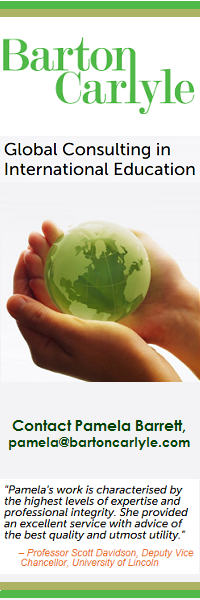International Educators
- About USjournal.com, LLC
- Advertising / Promotional Options
- Advertising Rate Card (pdf)
- Academic Program Listing (pdf)

- Current USjournal.com Advertisers
- Current USjournal.com Services
- Follow USjournal on LinkedIn
- FundsV Named Innovation Finalist
- Growth in Online Language Usage
- Multi-lingual Campaign Advantages
- SkyRadio Audio Segment (wma)
- Strategic Partnership with USDOC

- USjournal.communique
- USjournal History
- USjournal Innovation Lab
| usjournal.communiqué -
e-Recruitment Trends and Techniques, September 2003 eRecruitment in the Knowledge Economy |
This article was inspired by one in the September / October 2003 edition of EDUCAUSE Review: A Revolution in Knowledge Sharing. While the authors focus primarily on eLearning as it relates to academic course development, their ideas can be readily applied to administrative functions on campus -- including international student recruitment. (Text in italics is reprinted from that article.)
When a vibrant marketplace of knowledge networks and e-knowledge exists, providing immediate access to continuously updated knowledge as an expected amenity, learners will demand learning experiences and supporting resources to be engaging, interactive, participatory, and immediate... In a world of ambient technologies, pervasive knowledge networking, and multi-tasking learners, the dynamics of learning experiences must change to provide value to new generations of learners. (page 22)
Today's students are polite, but also bewildered at first, later disappointed, and often finally disillusioned and dispirited by passive learning experiences... They would rather explore than hear, make choices than be directed. (page 42)
And so it is with effective eRecruitment of international students. In many instances, prospective students form their critical first impressions of a campus via the internet. The students are fully aware of the internet's capabilities, thanks to their experiences with eBay, amazon.com, Napster, Abercrombie and Fitch and many other companies that define the students' generation.
In most cases, students' minimal expectations are getting higher. Those expectations can vary greatly, depending on your target market. For example, HTML eNewsletters (as opposed to text-only eNewsletters) are becoming more widely accepted and requested, especially because technology now exists that sniffs the recipient's preferred settings, to determine which medium to insert in his / her inbox.
Students expect that kind of customized (though automated) personalization. For example, the weekly eNewsletter that I look forward to most -- from BabyCenter.com -- has been labeled as SPAM by my system. But it's junk mail that I warmly welcome only because it is tailored to my particular situation. A few years ago when I first visited their site, I registered my Expected Due Date. That info has since triggered the distribution of information specifically related to my stage of pregnancy and my children's stages of infancy and toddlerhood ever since.
Similar concepts apply to eRecruitment of international students. For example, some U.S. campuses automatically post online each prospective student's application status, including which documents still need to be submitted to complete his / her application for formal consideration. eReminders are sent every 20 days from 1 February until 1 May, to coincide with that particular campus' application deadline.
So, while we certainly advocate responding on demand (personally) when possible, it's also very important for the students to perceive that your campus firmly grasps the power of the internet and its applications.
Most institutions have been tinkering with aspects of their knowledge ecosystem, not truly transforming their capacity to share knowledge... Over time, e-knowledge can change all this. It will do more than merely improve the efficiency of the existing channels and interactions for knowledge sharing... The new knowledge-sharing ecology will ground itself in collaboration, communities of practice, and knowledge networks... (page 20) The knowledge ecology of colleges and universities will need to change if they are to move from a culture of knowledge hoarding to one of knowledge sharing... (page 24)
International eRecruitment can be effective when implemented in a vacuum -- Online learning organizations have been particularly successful in attracting and enrolling students solely via online mechanisms at usjournal.com. More traditional educators have also converted a fair percentage of inquiries to enrollees. But the most successful advertisers are those who apply a truly integrated approach to eRecruitment. They coordinate a comprehensive recruitment plan, integrating their print material, overseas travel, alumni networks, online promotions and all other campaigns.
usjournal.com is leading that trend by enhancing our services yet again. We're now able to send customized messages (on behalf of our advertisers) to a particular subset of students from our database. We structure the campaigns without compromising our privacy policy, which prohibits us from selling or giving away our student information. Several advertisers have expressed interest in targeting students from specific countries that the advertisers will visit in the next two months; other advertisers are targeting specific academic fields. There's no extra charge for this service; just let me know what we can do for you.
Another critical element in the collaboration arena involves the fact that online organizations are realizing that they simply cannot be all things to all people; it's much more efficient to link to an established resource, than to attempt to re-create the proverbial wheel. For example, educational agents and advisors (particularly in Asia) are struggling to keep up with technological advances, while maintaining their close, personal counseling services. More and more of them are outsourcing particular functions, such as a student's initial selection process, to organizations like usjournal.com. For more details about this particular trend, please eMail me.
International eRecruitment is a dynamic market, to say the least. We're dedicated to keeping our finger on the pulse of the industry; the U.S. Journal of Academics has been leading the way in online international student recruitment for years. We would be delighted to assist you in enhancing your global promotional efforts. Call us at 570-339-4731, or e-mail cheryl@usjournal.com for more info.
You are welcome to re-print this usjournal.communiqué in full, under the condition that you include "Reprinted with permission of Cheryl Darrup-Boychuck, usjournal.com LLC, cheryl@usjournal.com."
Please let us know if you have other suggestions for topics in usjournal.communiqué. If you would like to subscribe to this brief e-newsletter, please complete the form. Thanks!

